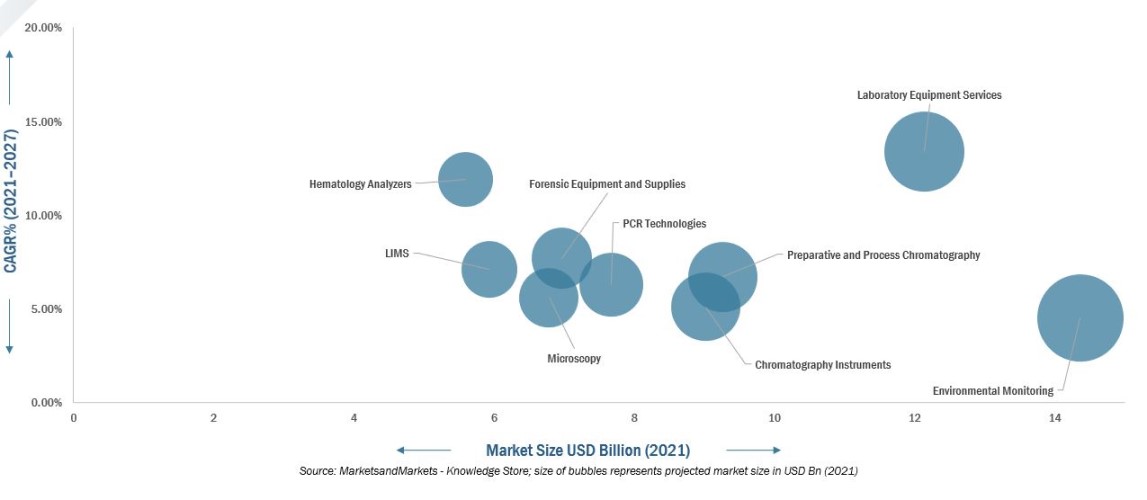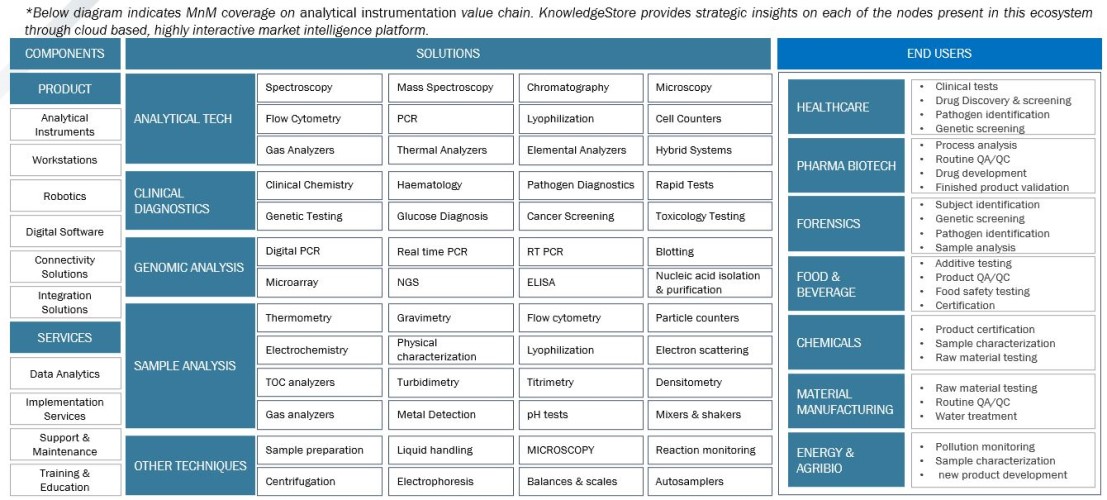DISRUPTION – PROCESS/SYSTEM INTEGRATION, DIGITIZATION, AND PORTFOLIO EXPANSION IN APPLIED INDUSTRIES ARE THE MAJOR TRENDS IN ANALYTICAL INSTRUMENTATION INDUSTRY WITH ~$46 BN WORTH OF REVENUE OPPORTUNITY BY 2027
TOP Chromatography Spectrometry Market GROWTH STORIES
MnM recently HELPED a client IDENTIFY AN INCREMENTAL REVENUE OF US$300-500 mn IN 4-5 YEARS IN chromatography ACCESSORIES & consumables market
SIMILARLY, ADJACENT end-use MARKETS HOLD A POTENTIAL OF OVER USD 30 BILLION IN ANALYTICAL Instrumentation industry, with clinical diagnostics, environmental monitoring, and forensics being the major contributors


WHY DO COMPANIES NEED HELP TO GROW?
ABSENCE OF ORIGINAL RESEARCH:
- Complex and fast evolving customer mandates in line with changing regulatory compliance, such as superior technologies to analyze impurities in pharma-biopharma products, food diagnostics, and environmental samples
- Hence, it is difficult to ascertain product development roadmap or suitable portfolio differentiation for specific customer groups
- Insufficient secondary research for strategic decisions
INTELLIGENCE IS NOT DEMOCRATISED:
- Evolving regulations specific to product quality & novel therapeutics are replicating into technology gaps within analytical & manufacturing landscape, that need to be complied by technology providers
- Limited visibility on evolving business model those are contributing to early success or steep revenue growth of prominent startups
MARKET PRIORITIZATION:
- Lack of GTM strategy, product features, and distribution model, especially in less penetrated geos such as ASEAN, META, LATAM
SOME UNKNOWNS & ADJACENCIES
- Adoption levels of automation and process integration in analytical technologies such as spectroscopy is limited and in silos. Currently it ranges between 30-40% globally, however, in developed countries it is approaching 70%. As process integration and digitization reduces TAT, helps in minimization of manual errors, and provides reproducible results, it is largely used in industrial researches and manufacturing
- AI, big data, digital twins, & other digital tools are increasingly being used in clinical research as they demand robust data analysis for regulatory compliance
- Increasing focus on hyphenated instruments (such as GC-MS), robotics, automated platforms to drive greater demand for clinical research & OMICS researchers
- Adjacent markets such as hyphenated instruments, environmental testing, food diagnostics, and forensic analysis to provide lucrative growth opportunities owing to current lag between technology evolution curve vs data analysis & storage demand among key customers
GROWTH PROBLEMS ENCOUNTERED BY Chromatography Spectrometry Market COMPANIES
Customer prioritization and assessing unmet needs:
- What are the disruptions in our clients’ businesses? How can we support them for our own growth?
- Who are the most potential customers going forward? Should we prioritize applied industries & contract testing labs over research labs or industrial labs/CROs?
- What are the key unmet needs of customers/non-customers? Who are the key stakeholders in different technology portfolio? Do vendor selection criteria differ by these? Which new product features should be added to the existing tools?
Where to Play:
- Which application areas should we focus on? Should it be drug discovery, clinical diagnostics, applied industries, environmental testing, or others?
- Which regions should we place our bets on? Should we continue with developed markets or do developing geos offer more growth opportunities?
Building a compelling Right to Win (RTW):
- For M&A, which are the right targets for us? Should we target technology vendors or AI/digital solution providers? Should we enter new markets directly or through partners?
- How can we differentiate w.r.t.. competition? What is their right-to-win vs ours?
OBSTACLES TO GROWTH FOR CURRENT PLAYERS
- Not able to keep pace with fast evolving customer needs for novel technologies - with greater workflow integration and automation
- Many start-ups and emerging companies are eating up market share of established companies through innovative payment model for consumables and rental agreements
- Limited clarity on unmet needs among customers/non-customers about changing technology needs, hence requirements for novel product features
- Limited clarity on current vs emerging/futuristic customer desires about technology integration, hyphenated instruments, and digitization
- Unclear picture about the regulatory and technology evolution curve
KEY UNCERTAINTIES/ PERSPECTIVES WHICH INDUSTRY LEADERS SEEK ANSWERS TO:
KEY QUESTIONS OF Chromatography Spectrometry Market COMPANIES
- What are the major technology/product segments driving adoption of hyphenated instruments (integrated systems, digital tools, etc.) in analytical lab space?
- What are the prominent product segments (on-premises vs remote operated instruments) that is poised to become obsolete in the next 5 years?
- Can process integration become affordable for academic research & applied industries, or will it continue to be used in industrial manufacturing & researches alone?
- What is the level of workflow integration & digitization that would be desirable among industrial & academic researchers by end of decade?
- How can industrial customers optimize manufacturing processes to be more agile while achieving complete process integration with minimum manual intervention?
- What regulatory policies can help strategize and achieve volumetric growth? How can institutionalized collaboration be leveraged in emerging markets to achieve the same?
- What can be more cost-effective strategies to support technology upgradation or infrastructure modernization among cost-sensitive customers?
KEY QUESTIONS OF COMPANIES IN ADJACENT MARKETS
- What are the regulations surrounding data privacy and security?
- What are current unmet data/digital needs w.r.t. remote operated systems or integration instruments portfolio being used by key customers?
- Is brand exclusivity important for hyphenated instruments or are users open to adopt brand or technology neutral instruments? What are the prominent customer groups those could be prioritized for short-term revenue growth?
- Which applications can be prioritized to achieve short term revenue growths by leveraging customer preference for hyphenated instruments in industrial researches or applied industries?
- How are companies handling unmet customer needs wrt process integration gaps vs current data analysis & archiving capabilities?
- When can a 100% process integration and digitization in clinical researches or industrial researches be expected?
- What will be the impact of process integration or digitization in environmental testing, forensic analysis, or clinical diagnostics market?
What is driving change
in your business
- Product life cycles getting shorter.
- Ecosystems getting converged.
- Newer technologies and new use-cases disrupting.
- New markets, new geographies, new clients, competition and partners.
Are changes only impacting you or your clients and their clients as well?
The trial will be a guided tour by our representative to help you discover the shift in revenue sources of your clients and clients' clients that will impact your revenue. This is your opportunity to unlock the research IP worth $100 million
mnm RESEARCH FOCUSES ON HIGH GROWTH & NICHE MARKETS – such as automated instruments, integrated systems, DIGITAL PLATFORMS, AND RELATED MARKETS
INDICATIVE LIST OF OTHER PROJECTS EXECUTED FOR Chromatography Spectrometry Market COMPANIES:
- STUDY
- Chromatography Instruments Market
- High-performance Liquid Chromatography Market
- Chromatography Accessories & Consumables Market
- Chromatography Reagents Market
- Preparative and Process Chromatography Market
- Mass Spectrometry Market
- Mobile Mass Spectrometers Market
- Raman Spectroscopy Market
- Atomic Spectroscopy Market
- UV/Visible Spectroscopy Market
- Molecular Spectroscopy Market
- Molecular Spectroscopy Market
- IR Spectroscopy Market
- Process Analytical Technology Market
- Microscopy Market
- Atomic Force Microscopy Market
- Flow Imaging Microscopy/Dynamic Image Analysis Market
- Liquid Handling System Market
WE HAVE A COMPREHENSIVE UNDERSTANDING OF THE ANALYTICAL INSTRUMENTATION ECOSYSTEM THROUGH OUR PROPRIETARY PLATFORM ‘KNOWLEDGESTORE’.
impacting you and
your clients
Chromatography Spectrometry Market COMPANIES
Judy Nolan,
Strategic Market Research Consultant,
Strategic Market Research Consultant
Markets and Markets has conducted two studies that were instrumental in developing our market book for segments of a market where depth of information is not readily available. The understanding they provided set the baseline for a market we expect to grow substantially above the overall market in the next five years. Without this common ground, our efforts could not be focused to maximize our future growth. The biggest asset was their willingness to seek alternative sources, work with our internal knowledge and synthesize a full analysis that all of the relevant players could support.
Second Panel
Third Panel







.JPG)
.JPG)









